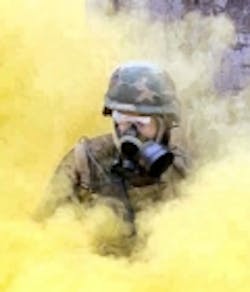SRI International to provide chemical warfare mapping in strategically important regions in $9 million DARPA contract
ARLINGTON, Va., 30 June 2010. Chemical analysis systems designers at SRI International in Menlo Park, Calif., will develop an advanced chemicals analysis system for chemical warfare defense that provides chemical mapping and reconnaissance after processing and identifying chemicals in the atmosphere under terms of a $9 million contract awarded Monday by the U.S. Defense Advanced Research Projects Agency (DARPA) in Arlington, Va.
SRI, an independent nonprofit research institute, will do the work as part of phases-2 and -3 of DARPA's Panoptic Analysis of Chemical Traces (PACT) program. The chemicals analysis system that SRI International will develop for DARPA will provide high-throughout, cost-effective, high fidelity identification of chemical constituents.
Ultimately, SRI International experts are trying to develop a chemicals analysis system able to analyze 100,000 samples every eight hours to revolutionize understanding of the chemical environment and enable routine chemical mapping of strategically and tactically important regions.
The DARPA PACT program seeks to develop high-throughput analysis methods to catalog the constituents of complex gas mixtures obtained from strategically important sampling locations. The system will identify and rank the amounts of all components from an established library of materials and quantify the extent to which materials not in the library are present.
PACT will also develop ways to identify compounds for which reference spectra have not been recorded by accepting gas mixtures whose individual analytes range in quantity from fifty picomoles to fifty micromoles. The PACT program manager at DARPA is Dr. Cindy Daniell.
SRI International will do the work in Menlo Park, Calif.; Plymouth, Minn.; Poway, Calif.; Toronto; and Seattle, and should be finished by mid-2012. For more information contact SRI International online at www.sri.com, or the DARPA Strategic Technology Office at www.darpa.mil/STO.
Follow me on TwitterJoin the PennWell Aerospace and Defense Media Group on Linkedin at http://bit.ly/9MXl9
Become a fan of Military & Aerospace Electronics on Facebook at http://bit.ly/1VGM0Q
Post your aerospace and defense-related material to the #milaero community on Twitter. Use the #milaero hashtag.
Join your industry colleagues in the Command Post community online at http://community.milaero.com
